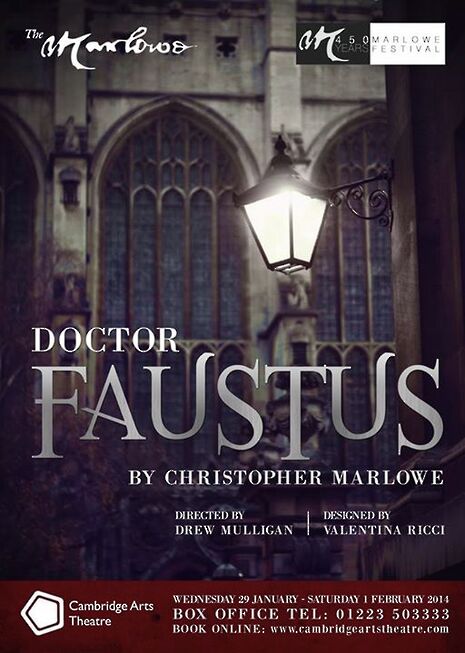Theatre: Doctor Faustus
Megan Dalton applauds the Marlowe Society’s latest, a production whose daring premise pays off.

This creative and somewhat zany take on Marlowe’s Doctor Faustus is an absolute must-see. Its acting is phenomenal, the set inspired, and the concept highly original.
The performance begins with a rehearsal. House lights remain up as actors, directors and technicians quarrel about the production. The potentially dangerous decision to frame the play within such an elaborate and lengthy meta-theatrical setup pays off to great effect, charming the audience with its self-reference. The brash rejection of the possibility of a female Mephistopheles was a fantastic touch, giving an extra dimension to the sense of subtle vindictiveness in Emma Powell’s wonderfully controlled performance as the devil’s messenger.
The Faustian pact is of course an incredibly well-known, culturally-integrated phenomenon, typically simplified to its premise: 'an evil man sells his soul to the devil in exchange for unparalleled power whilst he lives.' What the legend often loses in its re-evocation is that Faustus is a pathetic character. This is a man granted the power to do anything in the world who chooses to travel around performing glorified magic tricks. Mulligan’s production excels in bringing out the ridiculous comedy in Doctor Faustus, and Charlie Merriman’s nuanced performance shifts seamlessly between the tragically-anguished and the eccentrically-excitable Faustus. The comic moments of the play were often its strongest, with Hugh Stubbins and George Longworth’s portrayal of Robin and Rafe being side-splittingly hilarious due to a hyperbolic physicality and impressive rapport. Hellie Cranney’s appearance as the Duchess was also delightfully, decadently silly.
However, the endeavour to bring out the absurdity of the play occasionally undermined the intensity of its darker moments. Faustus’s first summoning of Mephistopheles involved an incredibly long and quite frankly awkward near silence as the protagonist prepared to call upon the devil. Rather than building a sense of dread as the inevitable approached, this underplayed preamble simply provided the audience with a sense of relief when something finally did happen. The physical presentation of Faustus’ demise equally fell short of the crescendo deserved by Merriman’s absolutely outstanding, tormented soliloquising as he neared his fate.
And yet when spectacle is done right in Doctor Faustus it really is magnificent. The first appearance of the devil was one of the few genuinely terrifying moments of the play. The set, comprised of three giant, moveable doors - utilised ingeniously throughout - really came into its own here, with projected shadows of a convulsing devil-figure creating a breath-taking image. The manifestation of the seven deadly sins was one of the most truly phenomenal and well-executed pieces of physical theatre I have ever seen – a credit to the actors, directors and creative team alike. I will not dull it with words: I can only urge you to go and see it for yourself.
 News / CUP announces funding scheme for under-represented academics19 December 2025
News / CUP announces funding scheme for under-represented academics19 December 2025 News / SU reluctantly registers controversial women’s soc18 December 2025
News / SU reluctantly registers controversial women’s soc18 December 2025 News / Cambridge welcomes UK rejoining the Erasmus scheme20 December 2025
News / Cambridge welcomes UK rejoining the Erasmus scheme20 December 2025 Features / Should I stay or should I go? Cambridge students and alumni reflect on how their memories stay with them15 December 2025
Features / Should I stay or should I go? Cambridge students and alumni reflect on how their memories stay with them15 December 2025 Film & TV / Timothée Chalamet and the era-fication of film marketing21 December 2025
Film & TV / Timothée Chalamet and the era-fication of film marketing21 December 2025









